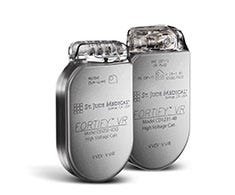October 11, 2016
Hundreds of thousands of devices are affected by the recall. Worse, the underlying problem may not be exclusive to St. Jude Medical.
Nancy Crotti

Early depletion of lithium batteries in some St. Jude Medical implantable cardioverter defibrillators has resulted in two patient deaths and prompted a recall by the company.
The batteries can run out within 24 hours of the devices' low-battery alert, according to a company statement. The actual number of devices with premature battery depletion is unknown, according to FDA and St. Jude Medical, but a total 349,852 affected devices remain actively implanted worldwide.
Investor jitters over lithium batteries not only affected St. Jude Medical's stock but also competitors Medtronic and Boston Scientific--as well as Abbott Laboratories, which is in the process of acquiring St. Jude for $25 billion. Although all four companies' stock were down by a few percentage points on Tuesday, a St. Jude spokeswoman said the company does not expect the advisory to have a financial impact on the company.
The problem that occurred with the batteries in the St. Jude devices could occur with any lithium batteries used in such high-voltage medical devices, according to Avi Fischer, MD, St. Jude's medical director and vice president of global education. The batteries provide charges to the devices' capacitors, which deliver the high-voltage shocks that bring a patient's heart to normal rhythms. The chemical reaction that occurs results in the formation of lithium particles that can deposit in a location that causes a short circuit, explained Fischer, who is also an electrophysiologist.
"It's a byproduct, if you will, of the battery performing its high-voltage charging function," Fischer said. "And it's not exclusive to St. Jude Medical."
Medtronic was still learning about the St. Jude recall through news reports and could not comment further, except to say that Medtronic uses different lithium batteries than St. Jude Medical.
A Boston Scientific spokesperson told Qmed's fellow UBM medical device news website MD+DI that Boston Sci made improvements to its ICD battery in March 2013 to avoid lithium clusters and associated premature battery depletion. With older ICD's, Boston Sci officials are confident about the device safety architecture, which includes accelerated battery depletion alerts for physicians and patients.
St. Jude officials declined to identify the company's battery manufacturer.
FDA and St. Jude issued an alert to patients, caregivers, and physicians, asking them to respond immediately to elective replacement indicator alerts. "Due to problems with these batteries, patients do not have the normal 3-month lead time for device replacement. Some batteries have run out within 24 hours of the patient receiving an ERI alert," says an FDA statement.
The St. Jude devices are designed to vibrate when the battery is nearing depletion. Patients should always contact their physician immediately when they experience the vibratory alert, the company added. Premature battery depletion can be detected during doctor office visits and through remote monitoring.
St. Jude called the early battery depletion a "rare occurrence" (0.21%) with the ICD and CRT-D devices, which were manufactured before May 23, 2015. Devices affected by the recall include St. Jude's Fortify VR, Fortify ST VR, Fortify Assura VR, Fortify Assura ST VR, Fortify DR, Fortify ST DR, Fortify Assura DR, Fortify Assura ST DR, Unify, Unify Quadra, Unify Assura, Quadra Assura, and Quadra Assura MP.
ICDs and CRT-Ds are both implanted under the skin in the upper chest area with leads that go into the heart. Patients need an ICD or CRT-D if their heart beat is to0 slow (bradycardia), too fast (tachycardia), or needs coordination to treat heart failure.
Nancy Crotti is a contributor to Qmed.
Like what you're reading? Subscribe to our daily e-newsletter.
[Image of Fortify VR courtesy of St. Jude Medical]
About the Author(s)
You May Also Like
